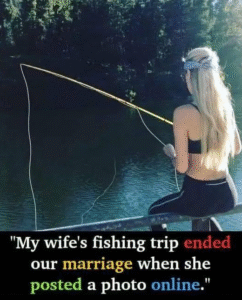How a Wife’s Fishing Trips Exposed Deep Marital Cracks — A 1000-Word Story
When Anna Leland first picked up a fishing rod, she expected nothing more than a peaceful new hobby—an escape from the noise of her busy life. What she didn’t expect was that her quiet mornings on the lake would unravel simmering truths about her marriage that she and her husband had ignored for years.
But that’s exactly what happened.
What began as a harmless pastime slowly turned into a mirror reflecting everything the couple avoided: their communication breakdown, growing distance, and unspoken resentments. The cracks had been there all along. Fishing just brought them into the light.
A Hobby That Started Innocently
It all began on a warm spring weekend when Anna accompanied her coworker Marcy to a local lake. Marcy had an extra rod, and Anna, curious and exhausted from juggling work and home responsibilities, figured it would be a quiet distraction.
She didn’t expect to love it.
There was something healing about the silence—the way the ripples danced on the water, the soft hum of morning insects, the thrill of a tug on the line. She felt calm for the first time in months. She felt herself again.
By the end of the morning, she bought her own tackle box and planned to return the next weekend.
Her husband, Aaron, barely reacted.
“Fishing?” he laughed. “You’ll get bored.”
But she didn’t.
The Distance Grows
At first, Anna’s Saturday morning fishing trips were short—two or three hours at most. Aaron slept in, played video games, or caught up on work emails. Neither of them saw the new routine as a problem.
But over time, her fishing trips got longer.
She discovered new lakes. She watched YouTube tutorials. She learned to tie different knots, choose better lures, and understand water patterns. She began waking up before sunrise and returning around noon.
Aaron started noticing.
He joked lightly:
“Should I be jealous of a lake?”
But inside, he felt uneasy—and he didn’t know why.
Small Remarks Revealed Big Feelings
After a few months, the dynamic shifted.
Aaron began making comments that sounded harmless but carried a sharp edge.
“You spend more time with that fishing rod than with me.”
“Another Saturday gone? Must be nice.”
“I guess the lake listens better than your husband.”
Anna brushed them off at first, not recognizing them as symptoms of something deeper. She reminded him he had his own hobbies—sports, gaming, long nights at his friend’s place. She wasn’t doing anything unusual.
But soon, every fishing trip became a debate.
“Why do you need to go so much?”
“Can’t you miss one weekend?”
“What’s really going on?”
The questions stung because Anna didn’t have the words to explain how fishing made her feel—lighter, calmer, grounded. She didn’t know how to tell Aaron that she felt invisible at home, or that the quiet of the water filled a void she didn’t realize had grown so large.
Resentments Bubbling Beneath the Surface
As Anna’s passion for fishing grew, so did the tension in the house.
Aaron felt abandoned. Anna felt misunderstood.
Neither said what they truly meant.
When Aaron snapped, “You care more about fish than your marriage,” Anna replied, “Maybe the fish appreciate me more!” It was meant as a joke, but it hit exactly where it hurt.
Both were defensive. Both felt unheard.
Still, neither wanted to admit there was a real problem.
The Breaking Point: A Weekend Alone
One Friday evening, Anna told Aaron she planned to join a group of women from a local fishing club on a weekend-long retreat. Two days on a lake, camping, cooking together, learning advanced techniques.
Aaron’s reaction was immediate.
“A whole weekend? Without even talking to me first?”
Anna was taken aback.
“I’m telling you now. It’s important to me.”
“That’s the problem,” he said quietly. “Everything important to you happens away from me.”
The argument that followed was weeks—maybe years—of suppressed emotion finally bursting through. Words neither of them meant were thrown like hooks in the dark.
“You never support what I enjoy.”
“You disappear every weekend like I’m not even here.”
“You don’t even try to understand me.”
“Maybe you don’t want to be home.”
When it was over, Aaron walked out of the house to “get some air.”
Anna packed her fishing gear in silence.
A Realization at the Water’s Edge
The next morning, as Anna stood on the lake with her rod in hand, the usual peace didn’t come.
Her mind kept replaying the argument.
She realized that fishing wasn’t the cause of their problems—it was the symptom. The lake had become her safe place because home didn’t feel like one anymore. Instead of talking about their drifting connection, she escaped into silence. Instead of admitting he felt lonely, Aaron hid behind sarcasm.
Fishing didn’t break their marriage.
It just revealed how fragile it had already become.
Anna sat on the dock, rod resting beside her, and cried harder than she had in years.
A Conversation That Changed Everything
When she returned home Sunday evening, tired and emotionally drained, she found Aaron waiting in the living room. He had flowers on the coffee table—not as an apology, but as a peace offering.
“You were right,” he said quietly. “I haven’t been listening.”
Anna sat beside him.
“And I haven’t been talking.”
For the first time in months, maybe years, they had an honest conversation.
She explained how fishing made her feel seen and whole again—not by anyone else, but by herself. She told him how overwhelmed she had been, how loud life felt, how invisible she sometimes became in their routine.
He admitted he felt disconnected, insecure, and afraid she was drifting away. He told her he missed her—but didn’t know how to express it without sounding controlling.
They talked for hours. No yelling. No sarcasm. Just truth.
It didn’t fix everything instantly, but it cracked open the emotional wall neither had realized was so high.
Finding Each Other Again
In the weeks that followed, they made small but meaningful changes:
Anna reduced her fishing trips—not because she was pressured, but because she chose balance.
Aaron joined her once in a while, not to control her hobby, but to understand it.
They created a rule:
No assumptions, no sarcasm, and no silent resentment. Just honesty.
Fishing no longer symbolized escape.
Instead, it became a bridge.
Conclusion: The Lake That Saved a Marriage
Anna’s fishing trips didn’t destroy her marriage—they exposed what needed healing. The cracks had always been there: unspoken expectations, lack of communication, misplaced frustrations.
But sometimes, life uses unexpected things—a hobby, a quiet lake, a few hours alone—to reveal truths we’ve ignored for too long.
In the end, fishing didn’t break them.
It brought them back to each other.


